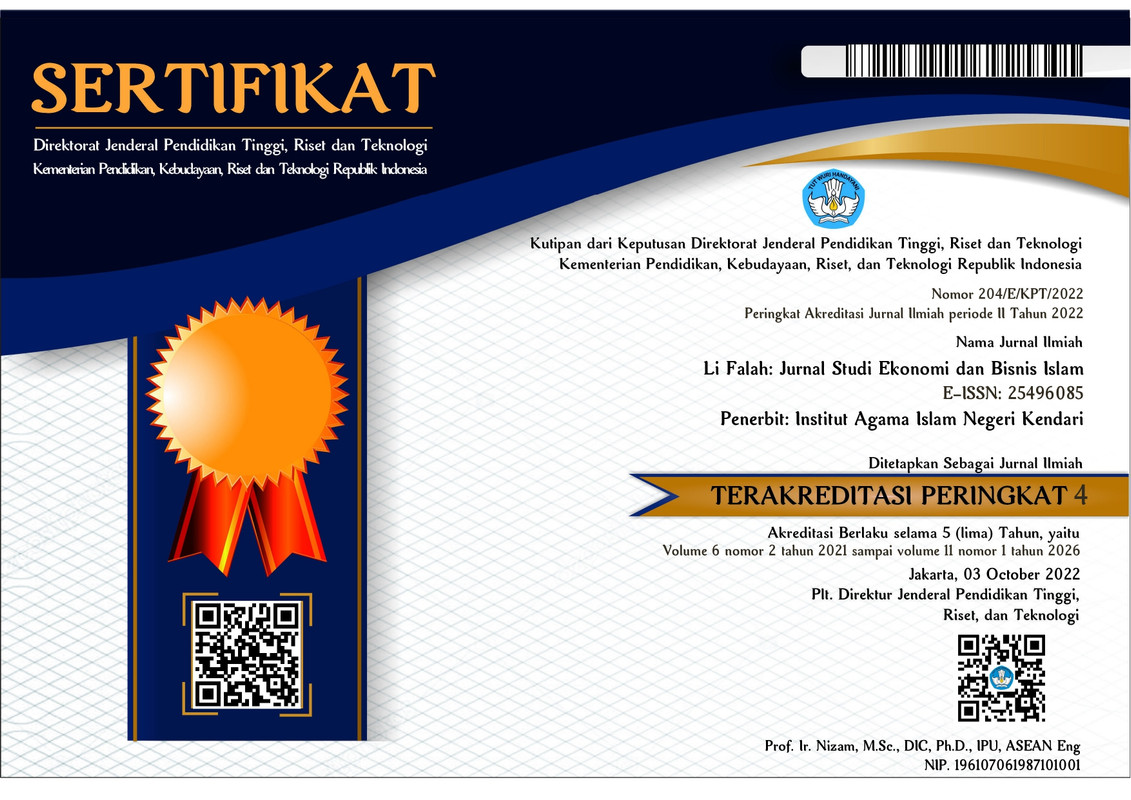Overqualification as a Blunt Weapon on Productivity Improvement: Person-Job Fit Theory Integration
Abstract
Despite the growing number of studies that underlie the influence between perceived overqualification (POQ) and counterproductive behaviour (PKP), there is still a gap in the lack of research involving the role of affective mechanisms on the effect of POQ on PKP. In this study, researchers focused on the mediating role of job boredom (KTP) in the pathway of influence of POQ on PKP. Using a sample of 106 employees and lecturers at Islamic universities in Indonesia and using the integration of the theory of person-job fit, the researchers found that KTP fully mediates the effect of POQ on PKP.
Keywords
Full Text:
PDFReferences
Baron, R. M., & Kenny, D. A. (1986). The moderator-mediator variable distinction in social psychological research: Conceptual, strategic, and statistical considerations. Journal of personality and social psychology, 51(6), 1173.
Bennett, R. J., & Robinson, S. L. (2000). Development of a measure of workplace deviance. Journal of applied psychology, 85(3), 349.
Bruursema, K., Kessler, S. R., & Spector, P. E. (2011). Bored employees misbehaving: The relationship between boredom and counterproductive work behaviour. Work & Stress, 25(2), 93-107.
Burris, B. H. (1983). The human effects of underemployment. Social Problems, 31(1), 96-110.
Cooper, D.R., dan Schindler, P.S. (2014). Business Research Methods, 12ed. New York: Mcgraw-Hill.
Deng, H., Guan, Y., Wu, C. H., Erdogan, B., Bauer, T., & Yao, X. (2018). A relational model of perceived overqualification: The moderating role of interpersonal influence on social acceptance. Journal of Management, 44(8), 3288-3310.
Erdogan, B., Bauer, T. N., Peiró, J. M., & Truxillo, D. M. (2011). Overqualified employees: Making the best of a potentially harmful situation for individuals and organizations. Industrial and organizational psychology, 4(2), 215-232.
Fox, S., & Spector, P. E. (1999). A model of work frustration-aggression. Journal of organizational behaviour, 20(6), 915-931.
Gibson, D. E., & Callister, R. R. (2010). Anger in organizations: Review and integration. Journal of Management, 36(1), 66-93.
Green, F., & Zhu, Y. (2010). Overqualification, job dissatisfaction, and increasing dispersion in the returns to graduate education. Oxford economic papers, 62(4), 740-763.
Hair, J.F., Hult, G.T.M., Ringle, C.M., dan Sarstedt, M. (2014). A Primer on Partial Least Squares Structural Equation Modelling (PLS-SEM). Thousand Oaks, CA: Sage.
Harari, M. B., Manapragada, A., & Viswesvaran, C. (2017). Who thinks they are a big fish in a small pond and why does it matter? A meta-analysis of perceived overqualification. Journal of Vocational Behavior, 102, 28-47.
Harju, L., Hakanen, J. J., & Schaufeli, W. B. (2014). Job boredom and its correlates in 87 Finnish organizations. Journal of occupational and environmental medicine, 56(9), 911-918.
Holtz, B. C., & Harold, C. M. (2013). Effects of leadership consideration and structure on employee perceptions of justice and counterproductive work behavior. Journal of Organizational Behavior, 34(4), 492-519.
Kim, J., Park, J., Sohn, Y. W., & Lim, J. I. (2019). Perceived overqualification, boredom, and extra-role behaviors: testing a moderated mediation model. Journal of Career Development, 0894845319853879.
Kristof-Brown, A., & Guay, R. P. (2011). Person–environment fit. In APA handbook of industrial and organizational psychology, Vol 3: Maintaining, expanding, and contracting the organization. (pp. 3-50). American Psychological Association.
Liu, S., & Wang, M. (2012). Perceived overqualification: A review and recommendations for research and practice. The role of the economic crisis on occupational stress and well being.
Liu, S., Luksyte, A., Zhou, L., Shi, J., & Wang, M. (2014). Overqualification and counterproductive work behaviors: Examining a moderated mediation model. Journal of Organizational Behavior, 36(2), 250-271.
Luksyte, A., Spitzmueller, C., & Maynard, D. C. (2011). Why do overqualified incumbents deviate? Examining multiple mediators. Journal of occupational health psychology, 16(3), 279.
Maksum, I., & Fikriah, N. L. (2020). Kepemimpinan islami dan etika kerja islami: Pengaruhnya terhadap kinerja karyawan. Li Falah: Jurnal Studi Ekonomi dan Bisnis Islam, 3(1), 90-110.
Maksum, I., Handoko, T. H., & Fikriah, N. L. (2020). Group cohesiveness on performance: mediating effect of collective organization citizenship behavior. Jurnal Manajemen, 24(03), 443-459.
Maynard, D. C., & Parfyonova, N. M. (2013). Perceived overqualification and withdrawal behaviours: Examining the roles of job attitudes and work values. Journal of occupational and organizational psychology, 86(3), 435-455.
Maynard, D. C., Joseph, T. A., & Maynard, A. M. (2006). Underemployment, job attitudes, and turnover intentions. Journal of Organizational Behavior: The International Journal of Industrial, Occupational and Organizational Psychology and Behavior, 27(4), 509-536.
Neuman, W, L. (2016). Metodologi penelitian sosial: pendekatan kualitatif dan kuantitatif (7th ed.). Jakarta Barat: PT Indeks.
Penney, L. M., & Spector, P. E. (2008). Emotions and counterproductive work behavior.
Reijseger, G., Schaufeli, W. B., Peeters, M. C., Taris, T. W., Van Beek, I., & Ouweneel, E. (2013). Watching the paint dry at work: Psychometric examination of the Dutch Boredom Scale. Anxiety, Stress & Coping, 26(5), 508-525.
Shen, K., & Kuhn, P. (2013). Do Chinese employers avoid hiring overqualified workers? Evidence from an internet job board. In Labor Market Issues in China. Emerald Group Publishing Limited.
van Hooff, M. L., & van Hooft, E. A. (2014). Boredom at work: Proximal and distal consequences of affective work-related boredom. Journal of occupational health psychology, 19(3), 348.
Watt, J. D., & Hargis, M. B. (2010). Boredom proneness: Its relationship with subjective underemployment, perceived organizational support, and job performance. Journal of business and psychology, 25(1), 163-174.
DOI: http://dx.doi.org/10.31332/lifalah.v6i1.2781
Copyright (c) 2021 Ikhsan Maksum, Nur Laili Fikriah, Agatha Mayasari

This work is licensed under a Creative Commons Attribution-ShareAlike 4.0 International License.
Li Falah : Jurnal Studi Ekonomi dan Bisnis Islam, Indexed In
Accredited By
View My Stats
Organized by : Fakultas Ekonomi dan Bisnis Islam
Published by : Institut Agama Islam Negeri Kendari
Jl. Sultan Qaimuddin No. 17 Baruga Kota Kendari Provinsi Sulawesi Tenggara
phone. +62401-3193710
Fax. +62401-3193710
Email: [email protected]



















